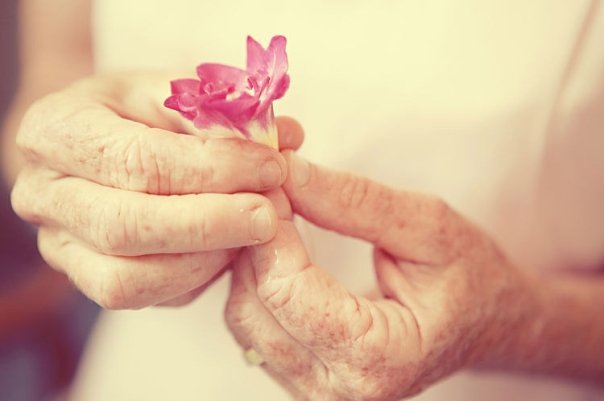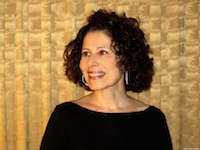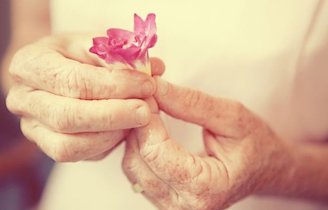
When my mother was diagnosed with bladder cancer, the first doctor she saw, whom she nicknamed “the Boy Scout” because he was roughly one-third her age, wanted to remove her bladder. But my mother wasn’t interested. “He’s a surgeon,” she explained. “Surgeons love to cut. I don’t want to live like that.” By “like that” my mother meant without a bladder and with a nephrostomy tube running from her kidney to a urine bag strapped to her leg.
The second doctor my mother saw recommended chemo but she wasn’t interested in that either. “The cure is worse than the disease,” she said, having witnessed the suffering of many of her friends. Finally my mother agreed to an endoscopic procedure that involved scraping the cancer cells out of her bladder. This treatment appealed to her because it had no side effects. She went in, came out, threw her portable oxygen tank over her shoulder and went on her way.
The oxygen was needed because my mother also suffered from COPD (chronic obstructive pulmonary disease). Both her illnesses were caused by a lifelong love affair with Chesterfield Kings, which began when my mother was 14. When she got sick, she reluctantly gave up her two-pack-a-day habit. But this was her only concession to either disease.
Life went on. My mother refused to think of herself as sick, let alone dying. She lived the life she had always lived. She finished the New York Times crossword puzzle every morning and watched “All My Children” every afternoon. She played mah jongg with her friends, and cooked dinner for my father.
She dispensed advice to my brothers and me, doted on her grandson, and saw a doctor only when absolutely necessary. Sometimes I got frustrated with her denial. Other times I admired the way she lived in the moment.
And then time ran out.
Eight years after her cancer diagnosis, my mother’s diseases began competing for her attention. Despite being on oxygen 24/7, she often found herself gasping for breath. But that was the least of her worries. Because of painful, frequent urination, my mother knew her cancer had spread outside the bladder wall, which meant a trip back to the Boy Scout. This time there was no choice: her bladder had to come out. During surgery, the doctor discovered the cancer had wrapped itself around her ureters and spread to her liver and kidneys. He gave her six months to a year, a year being unlikely.
When I told my mother, she simply nodded. “Everyone dies of something,” she said, matter-of-factly. “This is my something.” Then she patted my hand, as if I were the one in need of comfort. “It’s not a tragedy,” she said. “I’m 83 years old. I’ve had a good life. I have a wonderful husband, and three wonderful children who are all speaking to me and to each other and not currently in jail,” she joked. “I’m not afraid of dying.” As time went on, my mother grew weaker. Still, she refused to see an oncologist or pulmonologist. “What are they going to tell me that I don’t already know?” she asked. A year and a half passed. Then one night, my mother woke in terrible pain. I brought her to the hospital.
After three days, the doctor told her she couldn’t stay. “You’re not getting better and you’re not going to get better,” she said and then gave my mother two options: a hospice facility or hospice care at home. My mother calmly finished her crossword puzzle and then told me she’d like to go into a facility. This shocked me; she had always said she’d leave her home of 50 years “feet first.”
“This will be easier on your father,” she explained. “If I die at home, he won’t want to live there any more.”
When my mother was settled at hospice, I asked if she wanted visitors: her three childhood friends whom I called “the aunts” were desperate to see her. But she said no.
“You don’t understand,” she said. “They’re saying goodbye to one person. I’m saying goodbye to everyone. It’s too sad.”
My aunts asked if they could come anyway, but I told them no. My job was to honor my mother’s choices, even when I didn’t agree with them.
Her last choice was particularly difficult for me, despite being forewarned. A hospice nurse told me the very first day, “Your mother won’t die with you beside her. She won’t be able to let go.”
I so wanted to be there holding my mother’s hand at the end. But my mother had other ideas. On one of the few nights I didn’t sleep on a cot in her room, I startled awake at exactly 7:14 a.m. according to the digital clock beside me. I called the hospice and was told my mother’s nurse was too busy to talk. Twenty minutes later the nurse called to tell me that my mother had died at 7:14. It was as if she had tapped me on the shoulder to wake me up and tell me she was going. And then she was gone.

Lesléa Newman is a past poet laureate of Northampton, and the author of 65 books, including “Mommy, Mama, and Me” and “Daddy, Papa, and Me” and “Donovan’s Big Day.” Her latest poetry collection, “I Carry my Mother,” was published by Headmistress Press in January, 2015.
Follow her on Twitter: @lesleanewman
This essay was first published in the Daily Hampshire Gazette as part of their Dignity Project series and is reprinted with permission from the author and the newspaper.
To submit your essay on devotion or any other topic, send a 700-1,500 word piece in the body of the email to editors AT equallywed DOT com. You retain the rights to your work, but it may not have appeared elsewhere before publication on equallywed.com.
Photo: Our Labor of Love






























